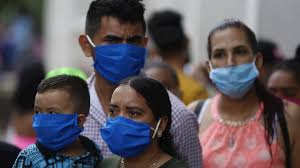Canadian study confirms Panama actions in pandemic fight

The importance of physical distancing and the use of masks and glasses, to prevent the spread of Covid-19 advocated by the Ministry of Health (Minsa) is confirmed in a study by scientists in McMaster University in Canada and published in the scientific journal The Lancet, but is difficult to enforce with a large number of people living in poverty.
Experts analyzed 172 observational studies from 16 countries evaluating distance measures, masks, and eye protection to prevent transmission of patients with confirmed or probable Covid-19, SARS, or MERS infection to people close to them (for example, caregivers, family members , health workers).
The study showed that the risk of infection is 12.8% at a distance of one meter, and it reduces to 2.6% at more than one meter away.
The scientists state that without mask protection the risk of virus transmission is 17.4% and with a mask is reduced to 3.1%.
Rodrigo DeAntonio , an epidemiologist and who is part of the team of the Advisory Committee for the Minsa Coronavirus, explained that the study consolidates the evidence from various observational analyzes, which supports the guidelines that the physical distance of at least 1 meter or more reduces the transmission of the coronavirus, and the greater the distance the better.
Minsa personnel have been in various parts of the capital city verifying the correct use of masks and raising awareness about physical distancing and handwashing.
However, last week it was evident that in Panama a percentage of the population is not complying, for example, with the distancing measure. On June 1, when the quarantine measure was lifted, crowds were seen enter supermarkets or boarding a bus and even in recreation areas.
Néstor Sosa, an infectologist and former director of the Gorgas Institute for Health Studies, maintained that one of the factors influencing the increase in Covid-19 cases in the country is that people are not keeping physical distance or do not use the masks.
He explained that it is very difficult to physically distance oneself in a residence with a bedroom and where six or more people live, and where the person who works is in the dilemma of buying rice, alcohol gel or a mask to protect themselves.
Available epidemiological information suggests that Covid-19 disease strikes the poorest people in the country the most. In Panama, there are an estimated 777 thousand Panamanians living in multidimensional poverty.





